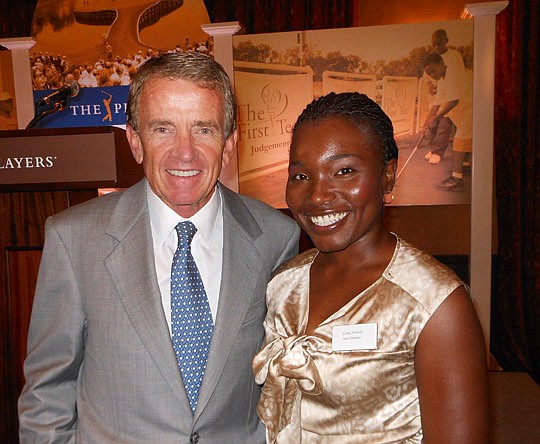
The title of Pulitzer Prize-winning columnist Thomas Friedman’s latest book, co-authored with Michael Mandelbaum, is “That Used to Be Us” with a subtitle of “How America fell behind in the world it invented and how we can come back.”
“When people hear the title, the first question is, ‘but does it have a happy ending?’” Friedman said Tuesday.
“Yes it does. We just don’t know yet if it’s fiction or non-fiction,” he said.
Friedman was the keynote speaker at the Champions for Education breakfast at the TPC Sawgrass Clubhouse.
The meeting brought business and community leaders together to discuss educational challenges facing the Jacksonville community and was one of a number of special events surrounding this week’s Players Championship.
“In addition to the 43 other things we’re doing this week, we actually have a golf tournament,” joked PGA Tour Commissioner Tim Finchem.
In addition to running golf tournaments, the PGA Tour has taken an active role in education in the community through its involvement in programs like The First Tee, which uses golf to help students develop character.
About 1,000 children and teen–agers in Northeast Florida currently are involved with The First Tee, and Finchem said the goal is to reach a total of 40,000 over the next 10 years.
Finchem said he recognized the importance of education when he began meeting with community leaders in the early 1990s.
“Every meeting I went to, the first thing on the list was education and development of our young people,” he said.
“Over the last 10 years, more and more has been done,” he said.
Several other community leaders also spoke about the need to become involved with educational programs.
“Education has certainly been ground zero for me,” said Jacksonville Jaguars owner Shahid Khan, referring to his now-familiar story about his start in this country at the University of Illinois at age 16.
“It is a subject and mission that I feel passionate about,” he said.
Gary Chartrand, executive chairman of Acosta Sales & Marketing, said businesses can become more involved by “adopting” schools and encouraging their employees to volunteer.
Chartrand, whose family formed a foundation to support education, said the graduation rate in Duval County high schools has risen from 58 percent to more than 70 percent in the past five years, but it’s still not enough.
“We are convinced we can do better. We are convinced we must do better,” he said.
“My message to you is to join in this movement. Commit to being part of the solution,” Chartrand said. “There is no more important issue in this community today.”
Mayor Alvin Brown agreed.
“We all have the power to do the right thing and set an example for the next generation,” he said.
Chartrand also talked about private-sector financial support for public schools.
According to The Community Foundation in Jacksonville, $15 million has been raised toward a goal of $100 million for The Fund for Quality Education, a citizen-led initiative housed at the foundation.
The fund is designed to support the Duval County Public Schools.
According to the foundation, the fund “seeks large-scale private contributions that can be invested in strategies to strengthen the human capital, governance and central operations integral to a successful public school system.”
The fund’s goal is to help Duval County Public Schools graduate all students to be ready for college or careers, and to be “able to succeed without remediation.”
Foundation President Nina Waters said this morning that the $100 million “will include local and hopefully national support at some level.”
Florida Commissioner of Education Gerard Robinson told the group that schools should be preparing young people for possible careers.
“We have to do a better job of linking economic development to education,” he said.
Robinson also said Floridians should be thinking globally when they think about improving education.
“We can’t have conversations solely about what we’re doing in Florida,” he said.
Friedman, a New York Times columnist who has reported stories from all over the world, said today’s students will have to be more creative about their career paths when they graduate from school.
“I had to find a job. Our kids will increasingly have to invent a job,” he said.
Friedman said the changing world has “crushed” a number of occupations that used to be considered “routine work.” But even people with special skills have to adapt.
“It’s not enough to be non-routine. You now have to be creative non-routine. Everybody has to bring something extra to their job,” he said.
Friedman said bringing something extra, which he referred to as “artisan” thinking, is one of four ways people should be thinking about their careers.
They should also be thinking like immigrants, who are “paranoid optimists” who manage to “stay hungry” even after they have established themselves.
He also recommends thinking like a startup company that wants to improve its products.
“Always be in beta mode,” he said. “Never think of yourself as a finished product.”
Lastly, Friedman believes everyone should think like the waitress who served him and a friend at a Perkins Restaurant & Bakery. The waitress brought his friend extra fruit with his breakfast and was rewarded with a big tip.
That’s an example of entrepreneurial thinking, no matter what the occupation is, Friedman said.
Despite the pessimism of his latest book’s title, Friedman said the authors “are two frustrated optimists.” But he said it will take work for America to continue succeeding in the global economy.
“There’s a lot at stake here,” he said.
“We’re not going to thrive by default. We do have to get our act together.”
356-2466